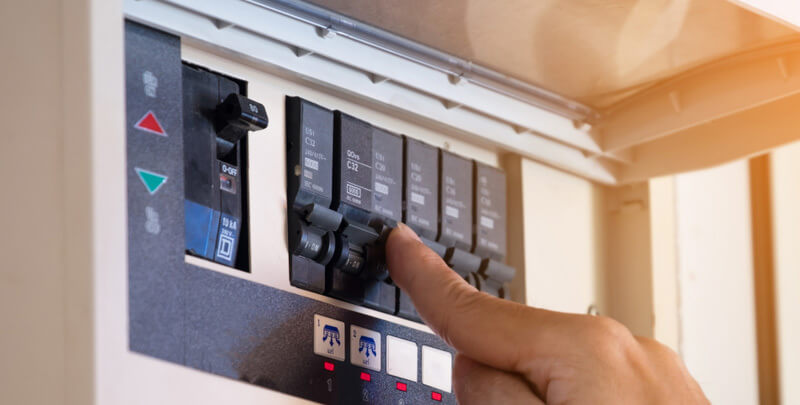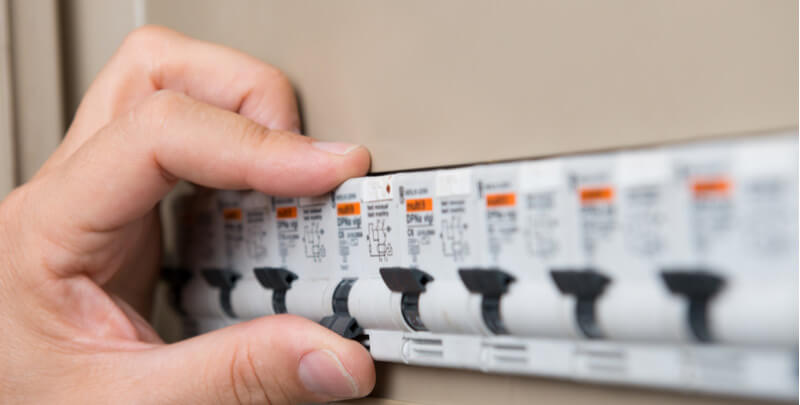How Do Circuit Breakers Protect Our Homes?

Electrical power is often taken for granted – up until the moment something goes wrong.
Blown fuses, surged appliances, or in dramatic cases, electrical fires, can interrupt the comfort and safety of our homes. The centrepiece of home electrical safety is often understated yet incredibly valuable – circuit breakers.
In this blog post, we’ll discuss everything you need to know about the circuit breaker, and how this humble device can save your home from potential electrical dangers.
Harnessing the Power of Circuit Breakers
Circuit breakers ceaselessly protect us and our valuable equipment from potential electrical harms.
They operate by knowing when to interrupt current flow and moving away from stationary contact in a circuit when the flow exceeds safe levels. This interruption safeguards electronic gear and wards off the risk of fires spawned from overheating due to high current.
Safety Mechanisms of Circuit Breakers
When dealing with volatile events like short circuits or overloads, the basic function of the circuit breaker becomes vital. In these instances, electrical current magnifies rampantly causing the breaker to react promptly.
The circuit is broken, halting any current flow in its tracks. This defensive mechanism shields our valued devices from damage, and more significantly, prevents potential fire hazards from excessively heated high currents.

Types of Circuit Breakers
Aside from the single pole circuit breaker, residential electrical panels typically utilise four main types of circuit breakers – low voltage circuit breakers, magnetic circuit breakers, thermal circuit breakers, and thermal-magnetic circuit breakers.
-
Low Voltage Circuit Breakers
Regarded as the common residential circuit breakers, low voltage circuit breakers are further classified into miniature circuit breakers and moulded case circuit breakers. These are designed for limited load current requirements and are perfect for the typical home environment.
The Miniature Circuit Breaker (MCB) is created to handle a load current of no more than 100A. This petite yet powerful component can be seen in varied amps and pole versions, each with its white reset switch—a signature feature.
The Moulded Case Circuit Breaker or Moulded Case Circuit Breaker (MCCB) is a sturdy electro-mechanical switch. Key components include the overload and short circuit protective functions. With a rated current of up to 1000A— it is built to withstand more significant loads.
-
Medium Voltage Circuit Breakers
On grounds of operation, medium voltage circuit breakers are most suited for handling bigger voltages. Their stride is mostly seen in commercial or industrial spaces but can still function effectively in large residential homes.
-
Ground Fault Circuit Interrupters
Protection meets precision with Ground Fault Circuit Interrupters. GFCIs are designed to quickly disconnect power to a circuit if it identifies electricity flowing along an unintended path—be it a person or water. Their main focus is on personal shock prevention.
-
Air Circuit Breakers
Lastly, we have the air circuit breakers. Known for their ability to control and prevent overloads, air circuit breakers highly secure the safety of your electrical equipment. Selection varies between the air blast and plain air circuit breakers, each with its unique benefits.
Breaking Down The Functionality of Circuit Breakers
Upon looking at a common circuit breaker like the MCB, we’ll notice three key positions—On, Off, and Tripped.
The “On” position indicates normal and safe current flow. The “Off” position denotes manual intervention to disconnect the circuit. “Tripped” is the breakthrough function that springs the MCB into action.
MCBs are armed with a bimetallic strip and an electromagnet—both activating the trip mechanism. It moves the operating handle to the ‘trip’ position and disconnects the circuit—thus posing as a great safety attribute.

Pros of Having a Circuit Breaker in Your Home
Owning a home involves managing various complex tasks, one of which is ensuring the safety of the electrical system. Circuit breakers are a significant part of this protection system. Here are some of the notable benefits of having a circuit breaker in your home:
- Prevents electrical overloads and short circuits: Circuit breakers are built to prevent electrical overloads and short circuits, events that can cause significant damage to your appliances and electrical gadgets. They detect and foil these situations by disrupting current flow until the issue is resolved.
- Safety: One of the primary benefits of a circuit breaker is the added layer of safety it provides. Circuit breakers act as the first line of defence against electrical fires and electrical shocks, which could result from overloads, short circuits, or other electrical problems.
- Easy identification of problematic circuit: Circuit breakers are divided into various circuits for different parts of your home. If there is an issue with one circuit, only the connected breaker trips. This feature assists in identifying the specific section where the problem occurred, making it easier to isolate the issue.
- Ground fault protection: Ground Fault Circuit Interrupter (GFCI) breakers offer protection against electrical shocks, particularly in wet locations like bathrooms or kitchens. These breakers detect leakages in electrical current and instantly disrupt power to prevent potential harm.
- Easy to reset: In the event of a tripped circuit, circuit breakers can be easily reset at the flip of a switch. Unlike fuses, which have to be replaced every time they blow out, circuit breakers can be used multiple times, offering convenience and cost savings over time.
- Long-term cost savings: Even though the initial cost of installing circuit breakers might be higher than fuses, they offer long-term cost savings. They are more durable and do not need to be replaced each time an overload occurs. Plus, the prevention of electrical damage can save you the cost of replacing expensive appliances and repair works.
- Enhances property value: If you’re considering selling your house in the future, having a modern and safe electrical system can be an attractive selling point. Potential buyers will appreciate the added safety and convenience that come with a home equipped with a well-maintained circuit breaker system.
The safety and convenience provided by circuit breakers make them an invaluable asset to any home. Keep your home safe, minimise risks, and focus on enjoying the comfort of your fortress without worrying about electrical disasters, thanks to circuit breakers.
Trusting the Circuit Breaker
A circuit breaker panel and shunt trip – big or small, all carry the vital function of ensuring the safe operation of the electrical circuits in our homes.
From MCBs to ACBs, all serve the supreme purpose of protecting our home from potential electrical damage as well as maintaining normal current. Thus, understanding their function is just as important as maintaining their well-being for a safe and cosy home.
So, pay special attention to these guards of your electrical fixtures and remember – a quick inquiry to your local electricians about replacing ageing or worn-out circuit breakers does more good to your home than you may think.
Please note: This information is provided for advice purposes only. Regulations differ from state to state, so please consult your local authorities or an industry professional before proceeding with any work. See After Hours Electrical’s Terms & Conditions here.